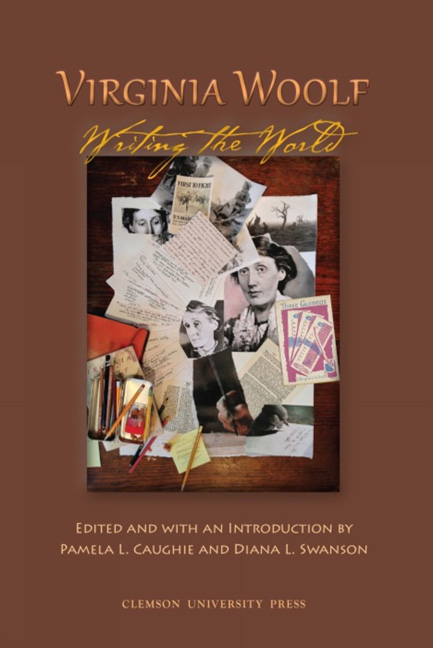Book contents
- Frontmatter
- Table of Contents
- Introduction
- Acknowledgmen
- Abbreviation
- WAR AND PEACE
- WORLD WRITER(S)
- Teaching Privileges: Three Guineas and the Cost of Global Citizenship
- From Guineas to Riyals: Teaching Woolf in the Middle East
- Fashionable Misconceptions: The Creation of the East in Virginia Woolf's Orlando
- From London to Taipei: Writing the Past in “Wandering in the Garden, Waking from a Dream” and Mrs. Dalloway
- An Estranged Intimacy with the World: The Postcolonial Woolf's Planetary Love in The Voyage Out
- “Shakespeare's Sister”: Woolf in the World Before A Room of One's Own
- Leonard Woolf: Writing the World of Palestine, Zionism, and the State of Israel
- ANIMAL AND NATURAL WORLD
- WRITING AND WORLDMAKING
- Notes on Contributors
- Conference Program
- Appendix: Virginia Woolf Conference Exhibit Items, Newberry Library
From Guineas to Riyals: Teaching Woolf in the Middle East
from WORLD WRITER(S)
- Frontmatter
- Table of Contents
- Introduction
- Acknowledgmen
- Abbreviation
- WAR AND PEACE
- WORLD WRITER(S)
- Teaching Privileges: Three Guineas and the Cost of Global Citizenship
- From Guineas to Riyals: Teaching Woolf in the Middle East
- Fashionable Misconceptions: The Creation of the East in Virginia Woolf's Orlando
- From London to Taipei: Writing the Past in “Wandering in the Garden, Waking from a Dream” and Mrs. Dalloway
- An Estranged Intimacy with the World: The Postcolonial Woolf's Planetary Love in The Voyage Out
- “Shakespeare's Sister”: Woolf in the World Before A Room of One's Own
- Leonard Woolf: Writing the World of Palestine, Zionism, and the State of Israel
- ANIMAL AND NATURAL WORLD
- WRITING AND WORLDMAKING
- Notes on Contributors
- Conference Program
- Appendix: Virginia Woolf Conference Exhibit Items, Newberry Library
Summary
I entitle this essay “Teaching Woolf in the Middle East” not because I see Qatar as representative of all of the Middle East but because of the fact that, due to the large importation of expatriate labor, Qatar brings people from all over the Middle East and indeed the world. While Qataris make up only 10% of the overall population, about 40% of my female students are Qatari. The rest hail from Jordon, Syria, Lebanon, Bahrain, the United Arab Emirates, Saudi Arabia, Egypt, Tunisia, Sudan, and Libya. We also have young women from South Asian countries like Pakistan, Bangladesh, and India. Except in rare circumstances, Qatar does not allow foreigners to become citizens; therefore, while many students claim allegiance to diff erent nationalities, most of them were born in Qatar and many of their parents were born there as well.
Despite the title of this paper, I do not wish to generalize about the experience of all Middle Eastern women. While I believe that my background as the great granddaughter of Lebanese immigrants creates a cultural bond between me and my students, I am fully aware of my status as a Western white female and the ethical challenges of teaching Western literature and feminism to young (mostly) Arab women. The purpose of this paper is to explore the limits of Western feminist ideology in the Middle East through Virginia Woolf's Three Guineas (1938). Because Woolf refuses to champion the ideology of liberal humanist thought, my students are introduced to the kind of argumentation that allows them to challenge an all-too-common tenet of liberal humanist feminism that insists upon the oppression of women in the Middle East.
I define liberal humanist feminism by the ideology of the International Women's Alliance (IWA) which, during the time that Virginia Woolf was writing Three Guineas, embarked on a world tour in an eff ort to recruit and mobilize women internationally around the common goals of suff rage and social equality. The IWA recorded their experiences with non-Western women in a journal entitled Jus Suff raggii or The Right to Vote and worked under the assumption that all women shared the common experience of patriarchal oppression.
- Type
- Chapter
- Information
- Virginia Woolf: Writing the World , pp. 99 - 103Publisher: Liverpool University PressPrint publication year: 2015



